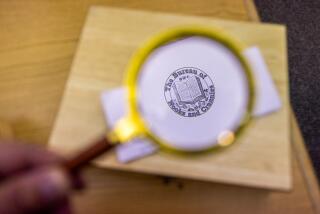Flashback to the ‘20s: A Farm Center Visit Stirs Memories
- Share via
I went back in time with my cousin Annabel recently, back to the late 1920s in Shafter, when we were both small children.
Shafter is a farm center 18 miles northwest of Bakersfield. Annabel grew up there. It is a small town now; it was a smaller town then. It had no fast-food joints, no bars, no movie theater, no high school.
It had a women’s club and a library. On Saturday nights the women’s club showed a movie. My cousin Donald accompanied the movie on the player piano. He tried to suit the piano roll to the mood. When anyone died, he played “Nearer My God to Thee.” That was the height of culture in Shafter in the 1920s.
Annabel’s mother, my Aunt Effie, was librarian for 35 years, beginning in 1925. We lived in Bakersfield at the time, a metropolis. In the summer, and sometimes on weekends, my father drove me out to visit Annabel. We were best friends.
I remember walking over the sandy soil (it was mined with treacherous stickers) to the library. It was a substantial-looking V-shaped red brick building with an arched doorway. When my Aunt Effie went home to water her plants, Annabel and I had the run of the place.
We used to duel with the slitted poles on which newspapers are hung. We pushed each other around on the oak book cart. One dreadful morning I crashed it into a desk, causing visible damage. We covered the splintered edge with spit and prayed that Aunt Effie wouldn’t notice it. She didn’t. Aunt Effie could be a terror when angry.
Annabel and I were drawn back to Shafter by the 25th anniversary celebration of the new library, which was built on the site of the old library in 1966. Annabel left Shafter in 1952.
The ceremony was held on the concrete apron in front of the library. It was not a large crowd. We sat on folding chairs. My Aunt Effie’s former assistant, Mary Neufeld Epp, recalled that when the new library was finished the old book cart, along with all the stored books, was moved into it.
I looked at Annabel. We had the same thought. Surely the old book cart that we had desecrated could not still exist! After the ceremony we looked for the cart. There it stood, behind the main desk. It was obviously very old and had seen much abuse. Were we part of its ignominious history?
Annabel wanted to go looking for her roots. It was amazing how many of the old landmarks remained. We found the house she lived in, still in use. Her world had been close about her. She was circled by friends. She could walk to visit them. She watched the blacksmith shoe horses; the barber kidded her about her freckles and her “golden hair”; the postmistress let her know when a shipment of baby chicks was coming in; she knew the owner of the drug store; she used to watch the filling station owner pump gas, literally, and choose a Delaware Punch from a barrel full of ice and pop; she watched the Santa Fe go by, throwing off a canvas sack of mail and snatching the outgoing sack from a pole; sometimes, at the depot, they pulled her around on a big baggage wagon with iron wheels; she could walk into the general store where her father worked behind the counter, helping herself to a cracker from the cracker barrel. (Her father was more often paid in groceries than in cash, and her mother had to board the seasonal potato buyers to make ends meet.)
The old Santa Fe depot had been moved a few blocks and turned into a museum. Among the old pieces of railroad equipment on display was a rough-hewn baggage wagon with iron wheels. Annabel was sure it was the one she had ridden on. It must have been as old as the book cart.
The corner where the general store had stood was now the Casino Bar.
Annabel recalled that for a time her parents had not had a telephone. When they had to make a call they used the phone of a neighbor. One day Annabel’s mother told her to go telephone her father and tell him to bring home bread and lettuce.
Annabel was excited. She had never used a telephone before. When the operator said the customary “Number, please,” she froze. She couldn’t remember the store’s number. She said, “Bring home bread and lettuce” and hung up, mortified.
She was afraid to tell her mother. But the day was saved. Her father came home with bread and lettuce. The operator had recognized Annabel’s voice and had rung up her father to give him the vital message.
No wonder Annabel felt secure.
Those days are gone forever.
More to Read
Sign up for Essential California
The most important California stories and recommendations in your inbox every morning.
You may occasionally receive promotional content from the Los Angeles Times.













